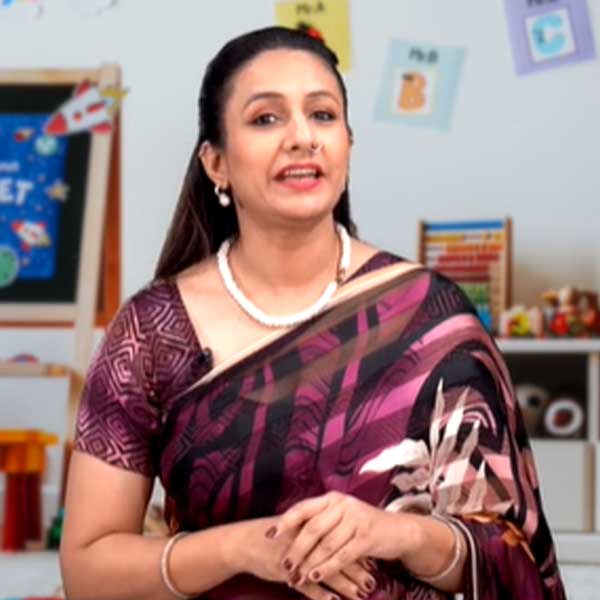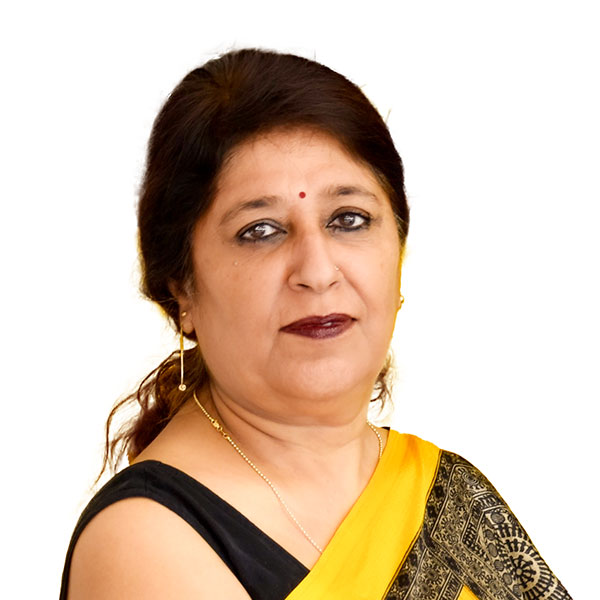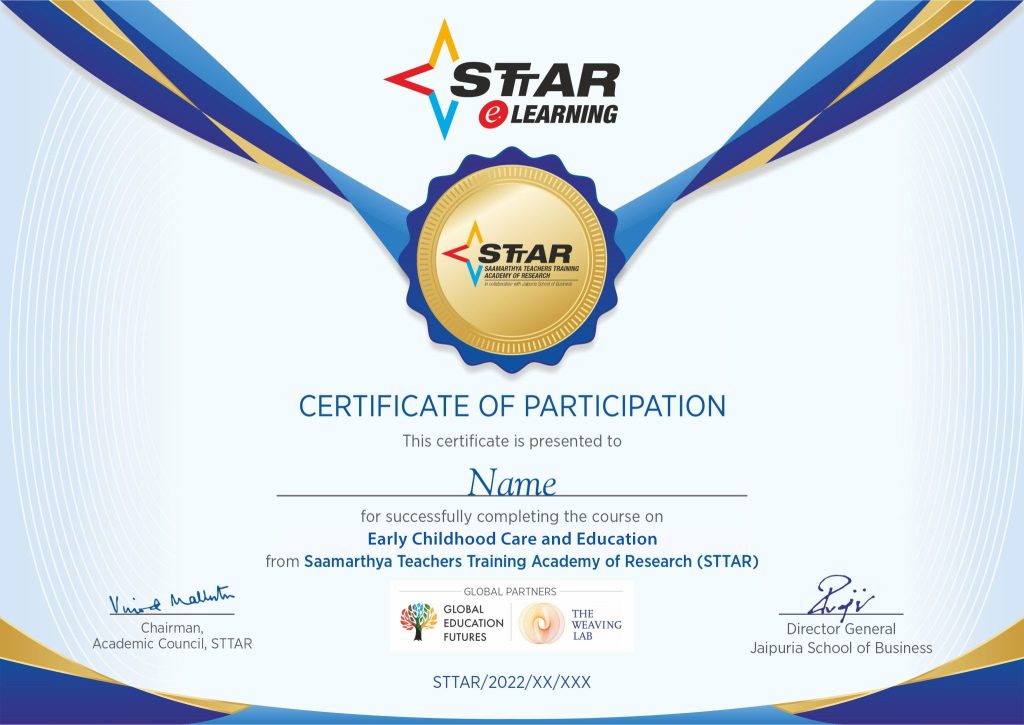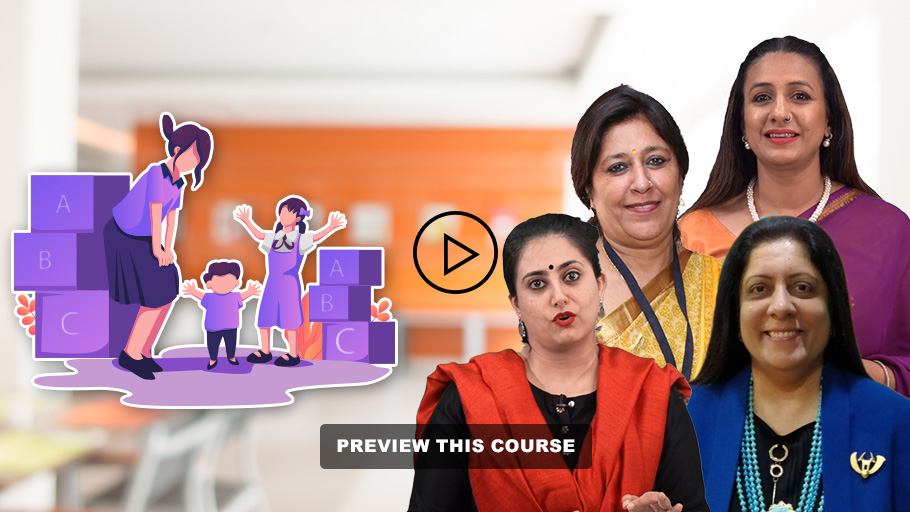Early Childhood Care and Education(ECCE)
- Develop competencies in ECCE in line with NEP 2020
- Learn International Synthetic Phonics techniques
- Understand Systematic Synthetic Phonics (SSP) and its benefits
- Leverage the power of storytelling for better student engagement and learning
- Learn to develop critical thinking through literacy, numeracy, stories, science, art and STEM
- Adopt the interdisciplinary approach in pre-primary teaching
- Implement strategies to trigger critical thinking in children through integration of subjects.
Reviews (267)
12.5 hours
72
29
8
Lifetime Access
557
STTAR E-Learning Certificates
About the Course
- Importance of Foundational Learning
- Fun for Phonics in Early Years
- Art Of Storytelling in Pre-primary
- Developing Critical Thinking Curriculum for Pre-Primary
Course FAQs
Early Childhood Care and Education (ECCE) is the essence of foundational learning and development in children. Studies suggest that over 85% of a child’s brain develops by the age of 6. These early years, during which neural connections are being formed inside the brain, are most significant to initiate the cognitive, linguistic, social-emotional, physical and motor development in children. ECCE is aimed at making foundational learning engaging and stimulate cognitive, emotional and psychomotor development in students.
Early years’ teachers.
This course will help you get a firm grasp on all the essential elements of ECCE. You will get to master the alphabetic code to facilitate linguistic and comprehension development in students through phonics. You will learn to leverage the power of storytelling to make learning engaging. Equally importantly, you will acquire the knowhow to develop a critical thinking curriculum to catalyze cognitive development in children.
Upon completion of the course, a participant will get the STTAR E-Learning Certificate for ECCE.
A teacher will have lifetime access to the course.
Yes, a teacher may do multiple self-paced learning courses at the same time. There is no limit to the number of courses a teacher may do simultaneously or one after the other.
Yes, the assessments are mandatory. A teacher will get the STTAR E-Learning Certificate only after completing assessments.
You will have to take three different assessments for this course: phonics, storytelling and developing critical thinking curriculum for the pre-primary.
Course Structure
(1) The Importance of Foundational Years
- 3 IMPORTANT DOCUMENTS ON EARLY YEARS - PART 1
- BRAIN DEVELOPMENT IN EARLY YEARS - PART II
- REQUIREMENT FOR THE BRAIN DEVELOPMENT IN EARLY YEARS -PART III
- IMPORTANCE OF BONDING IN EARLY YEARS - PART IV
- IMPORTANCE OF PLAY BASED LEARNING IN EARLY YEARS - PART V
- HIGHER BRAIN AND LOWER BRAIN - PART VI
- PRACTICES TO BE FOLLOWED IN EARLY YEARS - PART VII
- SOME THEORIES IN EARLY YEARS - PART VIII
(2) Fun with Phonics in Early Years
- Introduction- Language Development in Early Years
- Story of Letter A
- Story of Letter B
- Story of Letter C
- Story of Letter D
- Story of Letter E
- Story of Letter F
- Story of Letter G
- Story of Letter H
- Story of Letter I
- Story of Letter J
- Story of Letter K
- Story of Letter L
- Story of Letter M
- Story of Letter N
- Story of Letter O
- Story of Letter P
- Story of Letter Q
- Story of Letter R
- Story of Letter S
- Story of Letter T
- Story of Letter U
- Story of Letter V
- Story of Letter W
- Story of Letter X
- Story of Letter Y
- Story of Letter Z
- How can we teach Phonics? (Video)
- CVC Words (Video)
- Blending and Segmenting
- Sight Words (Video)
- Blends and Diagraphs (Video)
- Conclusion (Video)
(3) Developing Critical Thinking Curriculum for Pre-primary
- Introduction to Developing Critical Thinking Curriculum For The Pre-Primary
- Brain & Its development
- Developing Critical Thinking in Children
- Developing Critical Thinking Through Stories
- Developing Critical Thinking Through Poems and Rhymes
- Making Math Fun
- Extending Numeracy To Real Life
- Harnessing the Power of Music For Critical Thinking – Songs & Rhymes
- Magical World of Fairytales & Stories
- Environmental Studies
- STEAM Activities
- Using AR/VR to enhance classroom learning
- Brain & Its development
- Developing Critical Thinking in Children
- Developing Critical Thinking Through Stories
- Developing Critical Thinking Through Poems and Rhymes
- Making Math Fun
- Extending Numeracy To Real Life
- Harnessing the Power of Music For Critical Thinking – Songs & Rhymes
- Magical World of Fairytales & Stories
- Environmental Studies
- STEAM Activities
- Using AR/VR to enhance classroom learning
(4) Art of Storytelling in Pre-Primary
- Introduction to stories and a brief history of storytelling -Part I
- Introduction to stories and a brief history of storytelling -Part II
- Introduction to stories -Part III
- Essential tools of a storyteller
- Key Elements/ Essentials of a Story- Part I
- Key Elements/ Essentials of a Story- Part II
- Key Elements/ Essentials of a Story- Part III
- Props and Types of props puppets – Part I
- Props and Types of props puppets – Part II
- Types of Stories- Call & Action and Pourquoi Stories – Part I
- Types of Stories- Call & Drawing Stories – Part II
- Types of Stories- Call & Rhyme Away Stories – Part III
- Types of Stories- Call & Chain Stories – Part IV
- Types of Stories- Finger Stories– Part V
- Types of Stories- Musical Stories – Part VI
- How storytelling affects our brains – Part I
- How storytelling affects our brains – Part II
- Importance of storytelling and tips of storytelling- Part -I
- Importance of storytelling and tips of storytelling- Part -II
- Conclusion Video
- Resource material
About Instructors

Ms. Swati Popat Vats
President of the Association for Primary Education and Research

Ms. Kanika Ghai
Instructor

Ms. Poonam Kochitty
Instructor

Ms. Amrit Nagpal
Instructor

Earn The STTAR Certificate
After finishing the course, you will get a Certificate from STTAR in collabration with our Global Partners – Global Education Futures and The Weaving Lab.
- STTAR E-Learning Certificate – Early Childhood Care and Education.
People love learning with STTAR







